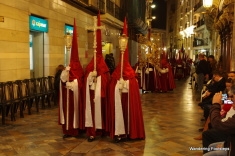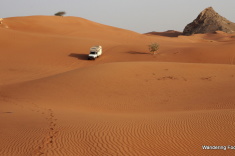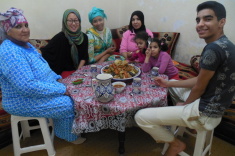As though Africa was grieving for our impending departure, the sky turned grey and ominous and the wind began to howl. White crested waves beat against the side of the ship like an African farewell drum circle.
We were leaving Africa, sailing forth to new seas, any minute now. At least that was the plan…
The journey to get to this moment in time hadn’t gone at all according to plan. There had been, of course, the process of getting our transit visas for Saudi Arabia, which had gone much more smoothly than planned. Then there was the actual purchase of the ferry tickets – the companies listed in our guide book no longer existed, the prices had doubled, and we couldn’t communicate our needs to the Arabic-speaking ticket man at the Namma Ferry Office in Port Sudan. And last, that very afternoon, the customs and immigrations procedures to get onto the ferry involved running around to multiple offices and depending on the kindness of Arabic-speaking security officers.
So why did I expect the ferry boat to leave when planned?
.jpg)
Namma Ferry.
.jpg)
Our Toyota lined up with all the other cars. “Where’s Waldo?”
I dangled my arms over the railing and looked overboard, trying not to dwell on the sordid conditions of our ferry boat. (Don’t worry mom, I’m talking aesthetics here.) We’d been eagerly welcomed aboard by the Egyptian crew, and swiftly whisked off to our first class cabin. I’d purposely set my sights low when I’d imagined the cabin prior to the journey so that I wouldn’t be disappointed. It turned out I hadn’t set them nearly low enough.
Our cabin was nothing compared to the restaurants and seating areas, however. It seemed that almost no one had paid themselves a room; instead, they’d laid themselves out onto seemingly every section of dirty ground available. Already, sugar and spilt tea littered the tables and floors. Dirty water from the toilets dripped out into the hallways. Men spat and cleared their nasal passages on the floor. The pervasive cigarette smoke was almost a welcome smell.
.jpg)
This is our first-class cabin. It looks a lot cleaner in the photo than it was for real.

Bruno and a member of the Egyptian crew.
I’d quickly given up trying to weave through the bodies and wet filth, and had retreated outside to stare at Suakin Island. Could we get going already so I could get off this ship?
I suppose I couldn’t complain too much. The conditions on my ship were certainly better than those of the thousands upon thousands of slaves who began their journeys to Arabia here. For several centuries, Suakin had been one of the main ports shipping slaves out of Africa – three thousand of them passed through here each year.
With the construction of Port Sudan a hundred years ago, the quarantine and clearing houses of Suakin Island fell into decay. Nowadays, its shallow port was mainly used for Muslim pilgrims heading to Mecca on their hajj (a pilgrimage that every able Muslim must complete once in his lifetime), as had been the case here prior to slavery. It certainly seemed to be the case on my ferry that day. Twice, the call to prayer had been shouted on the loudspeakers, and twice I’d inadvertently walked in on prayer sessions in the middle of the hallways and out on deck.

Bound for Jeddah.
Indeed, it was getting late. The sun had set undramatically – indeed, almost imperceptively – behind a wall of cloud. I’d imagined leaving the African continent aboard a ferry with a glowing-red setting sun waving me off. In my mind it had been quite romantic. I’d even thought of the African things I was going to miss, like the local market, the wild animals, the wide open spaces. I’d planned for our departure to be full of emotion, slightly philosophical, and deeply poetic.
Instead, I found myself screaming, “Can we get the F*$! out of here???” to the birds fishing in the water beside me.
It must have been my coarse language, because the motor roared to life, the ropes were finally pulled back, and we set awkwardly forth (we had to be steered by two little boats through the shallow lagoon). When we were finally in open water, Bruno and I headed back to our first class cabin. I was thankful for the private toilet and the peace (I was the only white woman aboard and had already grown tired of the stares from the mostly-male passengers), but it was still an incredibly uncomfortable night. Between the abhorrent mattress and sheets and the heavy rocking on the storm-ridden seas, I slept barely a wink.

Some random passengers who wanted me to take their photo.
We arose the next morning to a new continent. Actually, that’s not at all true. I had had the romantic notion that that would be the case, but alas, we woke up to pounding waves all around us and land nowhere in sight. We were late. Very, very late.
I drank cups of tea, and munched on some cake I’d brought. I sat outside with the waves, trying to avoid the restaurants and seating areas inside (“You have to see it to believe it,” declared Bruno in shock when we’d gone to the restaurant that morning for tea, referring to the conditions the night had inflicted upon its already questionable cleanliness).

Sitting out on deck, dazed, the morning after my horrible sleep.

Saudi Arabia is finally on the horizon! Better get used to my head scarf! 🙂 (Notice the tea in my hand, and remember it when you read my next blog.)
Hours passed. I was beginning to feel like I was a character in Jean-Paul Sartre’s play, No Exit. The boat was my prison and there was no escape. Even when we finally spotted land, there were so many cargo ships in line that we sailed a two-hour loop around the coast of Jeddah before finally heading into port. And then, when we’d tacked up to shore and the engines had stopped, we had to wait another ninety minutes to get off the boat. By this time it was 3:30pm, we were seven hours late, and we’d been on this prison-boat for almost twenty-four hours.
I was hungry and dehydrated as we passed through immigration in Jeddah. I hadn’t planned to be on the boat so long, and hadn’t brought enough food or water, or purchased them aboard while the shops had still been open that morning. So when a Saudi man – dressed like the perfect Arab from my imagination – walked up to us with hot cups of tea, biscuits, and croissants, I thought I was seeing my guardian angel. How had he known exactly what I wanted – no, needed – at that moment? And why had he cared?

Our Saudi savior.

Devouring the tea and croissant that my Saudi savior brought me in Jeddah.
My wonderful first impression of Arab hospitality in this oh-so-foreign land kept me going the next few hours, while we waited to retrieve our Toyota. Bruno ran around getting papers and stamps – a whopping mass of confusion that would have been impossible without the kind insurance man who guided us throughout the process – while I sat and waited (one of the benefits of being in a country where woman aren’t allowed to do anything!).

Waiting to pick up our Toyota in Jeddah (I snuck this picture and was yelled at afterwards!).
Finally, long after the sun had set, our Toyota appeared like a beacon of light. Our beloved home, with its clean sheets and a wonderful mattress, was finally before us! We were finally free! No more paperwork, no more patient waiting, no more disgusting ferry trip. Just us, Totoyaya, and the open road of Saudi Arabia!
Practical Information for Sailing to Saudi Arabia from Sudan:
Ferry Companies
- Bahaboud – currently closed for maintenance, hope to restart ferry journeys soon
- Namma Ferry – what we took; Monday, Wednesday, Friday departure from Suakin, Sudan
Ferry Prices as of January 2015 (subject to high inflation)
- Ticket for vehicle – $160
- Ticket for passenger – $65
- First-class cabin – $35
Length of Journey (including pre- and post- journey paperwork)
- Sudan customs and immigration – 3 hours
- Departure time – technically 6pm, but often 8pm
- Journey – technically 14 hours, but for us 18 hours
- Disembarkation time – 90 minutes
- Saudi immigration and customs – 3.5 hours
Procedures
- Get Saudi Arabian transit visas in Khartoum
- Purchase ferry ticket in Khartoum, Port Sudan, or Suakin
- On day of ferry, go to Sudanese customs, for which help from an Arabic-speaker is almost essential
- Then go through Sudanese immigration, for which help from an Arabic speaker is essential, since you have to visit 5 different offices, none of which are in the same place or in any comprehensible order. (Bring along two photocopies of passport and two photocopies of Sudanese visa, as well as 21 Sudanese pounds)
- Upon arrival in Saudi Arabia, go through immigration – simple and straightforward, alhamdulilah!
- Lastly, the challenging Saudi customs (to recover vehicle), for which help from an Arabic-speaker is essential, since it involves several offices and stamps in no order. You will not be able to get a stamp for your carnet de passage. Insurance for a week is $18 and another $45 for port fees. (You can also pay in Saudi riyals).
Advice
- Bring your own bedding on the ferry. This is a must-do!
- Bring water and food, in case the ferry arrives late. You can eat and drink on the ferry, but in the morning the restaurants and shops are open quite late and only for a short time. Getting to the shops is a journey!
- Don’t drink too many cups of tea or coffee on the boat. I came down with a wicked stomach illness (but that’s a story for later!)
- Arm yourself with lots of patience for the paperwork, the running from office to office, the confusion, the lack of English, and the lack of order.

Port of Jeddah.



muritala - Can I enter saudi are bian with Nigeria passport for humura andhajji
Brittany - I think so. We saw many Africans traveling home from Saudi after Hajji. Sorry we don’t know more details, but best of luck.
Yusuf - i enjoy reading this story, i plan my jouney next year (2018) from nigeria.
Brittany - Hi Yusuf, best of luck on your journey next year! I hope you will enjoy! Thank you very much for saying hello. 🙂
Matthew Ames - Love this thanks. Planning to it it in January 2017.
Brittany - Best of luck! It’s a fantastic and fascinating journey!
Denis Le Jeune - I have a South African registered RHD LandRover Defender which we’ve driven from Cape Town to Lalibela Ethiopia. I’ve been told Saudi Arabia won’t allow RHD vehicles to use the highway. Is this correct?
Denis Le Jeune Cape Town
Brittany - According to our information, this is indeed correct. Unfortunate for you. Best to head through Egypt!
Best of luck, and enjoy the road.
Amila - Hi
I was working on the ferry boat on 199’s era. it was so different experience for me. OH AND S regulations were only for rules, and documents only.
but I really enjoyed working here.
Brittany - Hello Amila,
Yes, I am sure things have changed since the 1990s! 🙂 Were you working on the line between Sudan and Saudi Arabia? That must have been a very interesting job! I do love being out on the sea, though I think I prefer a sailboat! 🙂
Thank you very much for saying hello!
Brittany and Bruno
Elizabeth Sears - Brittany, a head scarf becomes you! Quite the adventure (ugh)but one I would not want to experience. You provide useful tips and advice, however, for those brave travelers who do. Glad you are feeling better…
Brittany - Bruno keeps saying that this counts as the cruise every married woman asks for from her husband. Ummmm, I think NOT!!! 🙂